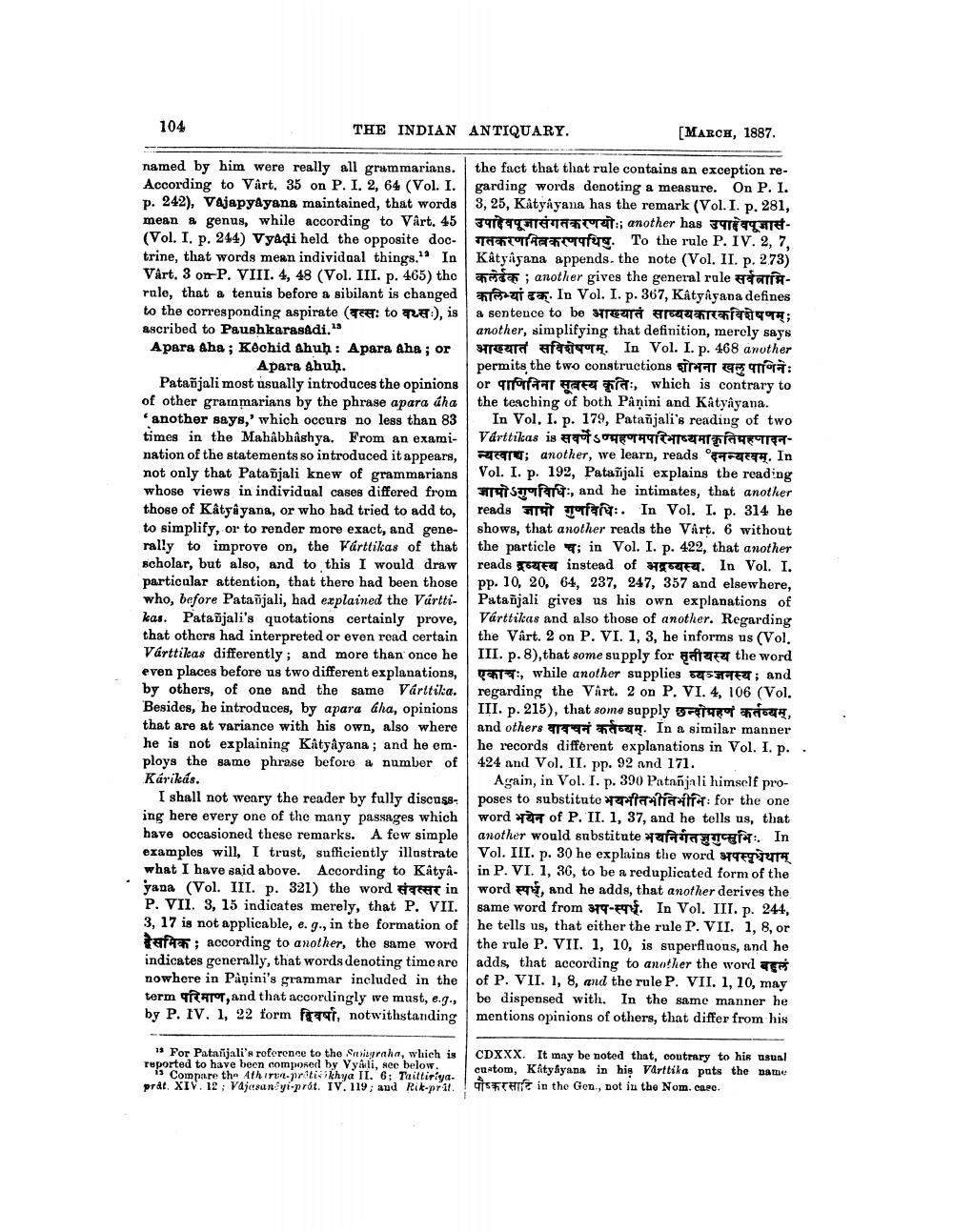________________
104
THE INDIAN ANTIQUARY.
[MARCH, 1887.
named by him were really all grammarians. the fact that that rule contains an exception reAccording to Vårt. 35 on P. I. 2, 64 (Vol. I. garding words denoting a measure. On P. I. p. 242), Vajapyayana maintained, that words | 3, 25, Katyayana has the remark (Vol. I. p. 281, mean a genus, while according to Vârt. 45 591 T
F
r it:: another has 3 T(Vol. I. p. 244) Vyaçi held the opposite doc- A f g. To the rule P. IV. 2, 7, trine, that words mean individual things." In Katyayana appends. the note (Vol. II. p. 273) Vârt. 3 on P. VIII. 4, 48 (Vol. III. p. 465) the 1 ; another gives the general role at rale, that a tenuis before a sibilant is changed i ca. In Vol. I. p. 367, Katyayana defines to the corresponding aspirate (Tee: to pu), is & sentence to be EU refera T E; escribed to Paushkarasadi.15
another, simplifying that definition, merely says Apara Aha; Kechid ahuḥ: Apara aha; or Seura T. In Vol. I. p. 468 another Apara Ahuḥ.
permits the two constructions शोभना खलपाणिनेः Patañjali most usually introduces the opinions or quorfarar are rat, which is contrary to of other grammarians by the phrase apara dha the teaching of both Panini and Katyayana.
another says,' which occurs no less than 83 In Vol. I. p. 179, Patañjali's reading of two times in the Mahâbhâshya. From an exami- Värttikas is SETTITAT nation of the statements so introduced it appears, F r ; another, we learn, reads 47274. In not only that Patañjali knew of grammarians Vol. I. p. 192, Patañjali explains the reading whose views in individual cases differed from | Sure, and he intimates, that another those of Kâtyayana, or who had tried to add to, reads are tag. In Vol. I. p. 314 he to simplify, or to render more exact, and gene- shows, that another reads the Vart. 6 without rally to improve on, the Varttikas of that the particle in Vol. I. p. 422, that another scholar, but also, and to this I would draw reads व्यस्य instead of अद्रव्यस्य. In Vol. I. particular attention, that there had been those pp. 10, 20, 64, 237, 247, 357 and elsewhere, who, before Patañjali, had explained the Vártti- Patañjali gives us his own explanations of kas. Patañjali's quotations certainly prove, Värttikas and also those of another. Regarding that others had interpreted or even read certain the Vårt. 2 on P. VI. 1, 3, he informs us (Vol. Värttikas differently; and more than once he | III. p. 8), that some supply for a t the word even places before us two different explanations, *14, while another supplies 5577; and by others, of one and the same Várttika. regarding the Vart. 2 on P. VI. 4, 106 (Vol. Besides, he introduces, by apara kha, opinions III. p. 215), that some supply 3- RT , that are at variance with his own, also where | and others वावचनं कर्तव्यम्. In a similar manner he is not explaining Kâtyâyana ; and he em. he records different explanations in Vol. I. p.. ploys the same phrase before a number of 424 and Vol. II. pp. 92 and 171. Kárikás.
Again, in Vol. I. p. 390 Patanjali himself proI shall not weary the reader by fully discuss- poses to substitute fortatatiralft: for the one ing here every one of the many passages which word are of P. II. 1, 37, and he tells us, that have occasioned these remarks. A few simple another would enbstitute भयनिर्गतजुगुप्सुभिः. In examples will, I trust, sufficiently illustrate Vol. III. p. 30 he explains the word sTTETUUT what I have said above. According to Katya- in P. VI. 1, 36, to be a reduplicated form of the yana (Vol. III. p. 321) the word in word PTT, and he adds, that another derives the P. VII. 3, 15 indicates merely, that P. VII. same word from 379-FT. In Vol. III. p. 244, 3, 17 is not applicable, e.g., in the formation of he tells us, that either the rule P. VII. 1, 8, or tafa ; according to another, the same word the rule P. VII. 1, 10, is superfluous, and he indicates generally, that words denoting time are adds, that according to another the word aan nowhere in Påņini's grammar included in the of P. VII. 1, 8, and the rule P. VII. 1, 10, may term CATT, and that accordingly we must, e.g., be dispensed with. In the same manner he by P. IV. 1, 22 form feat, notwithstanding mentions opinions of others, that differ from his
For Patañjali's roforence to the Stagraha, which is CDXXX. It may be noted that, contrary to his usual reported to have been composed by Vymli, see below. 13 Compare the Ath Irelpritiskhya II. 6: Taittiriya.
custom, Katyfyana in his Varttika pats the name prat. XIV. 19; Vajasan yi-prát. IV, 119; aud Rik-pril. !95TH in the Glen, not in the Nom. caee.




